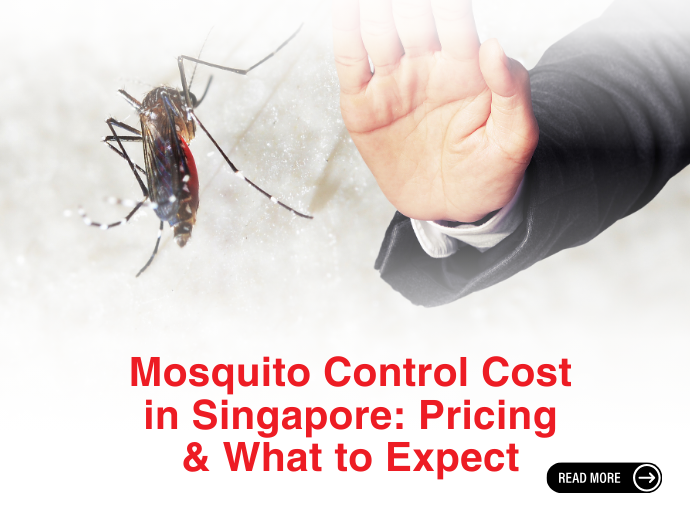While the entire nation is battling away Covid-19 in the year 2020, Singapore faces a fresh dengue threat this year. Little attention is paid to dengue and Zika virus when everyone is focusing their attention on the prevention of coronavirus. Annually dengue virus infects about 400 million people worldwide, with high prevalence in tropical and sub-tropical regions. In Singapore, there was a record high of weekly dengue cases in June 2020, the highest number ever recorded since 2014.
The National Environment Agency (NEA) explained that the sudden rise in dengue infection last year was due to a strain of dengue virus that has not been seen much for many years. It is known as the DENV-3 virus, and there has not been an outbreak of this serotype here in the past three decades, which means that there is low immunity in the Singapore population to defend against this serotype.
What causes dengue fever?
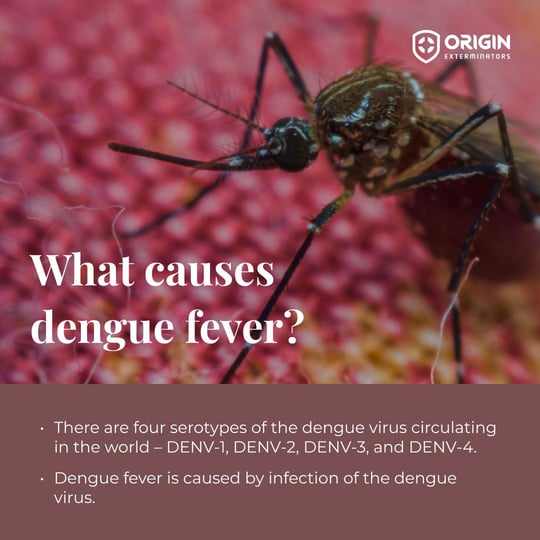
For those who do not know, dengue fever is caused by infection of a dengue virus. There are four serotypes of the dengue virus circulating in the world – DENV-1, DENV-2, DENV-3, and DENV-4. These are four related but antigenically distinct serotypes, where deep genetic studies have suggested that all four serotypes actually evolved from a common ancestor in primate populations approximately 1000 years ago, and all four separately emerged into an urban human transmission cycle 500 years ago in Asia and Africa. Each serotype is known to have several different genotypes, in other words, the genetic makeup of the virus. Viral genotype and serotype, and the sequence of infection with a different serotype, appear to affect disease severity. All four serotypes are available in Singapore.
How do we get infected with the dengue virus?
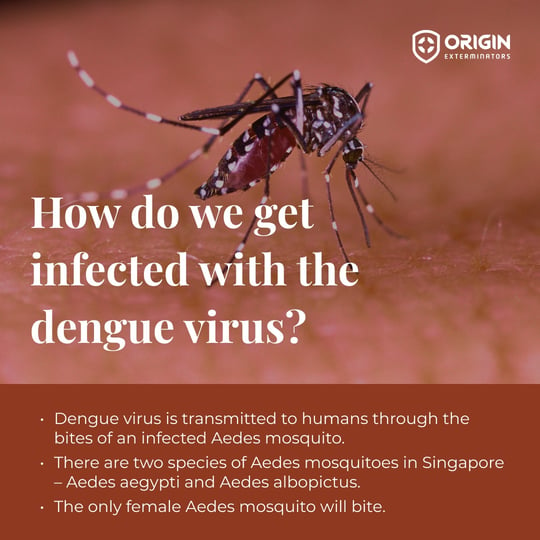
Dengue virus is transmitted to humans through the bites of an infected Aedes mosquito. You cannot get the dengue virus from human-to-human contact. There are two species of Aedes mosquitoes in Singapore that carry the dengue virus – Aedes aegypti and Aedes albopictus. While they look different, both species are able to transmit the disease. Aedes mosquito is infected with the virus when it takes a blood meal from a dengue-infected person. Only female Aedes mosquitoes will bite, as they need the nutrients in our blood to create eggs. The virus replicates inside the female Aedes mosquito’s body, and about one week later, the mosquito can then transmit the virus to other people that it bites.
What happens when we get infected with the dengue virus?
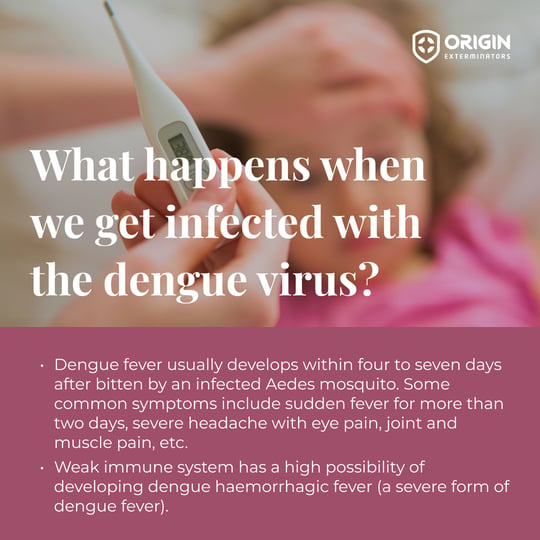
Dengue fever usually develops within four to seven days after being bitten by an infected Aedes mosquito. Common symptoms include sudden onset of fever which lasts for more than two days, severe headache with eye pain, joint and muscle pain, skin rashes, nausea, and vomiting, bleeding from the nose or gums, or easy bruising of the skin, and extreme weakness and lethargy.
If you have a weak immune system, there is a high possibility of developing dengue hemorrhagic fever, also known as dengue shock syndrome. This is a severe form of dengue fever that could result in death.
What is the treatment for dengue fever?
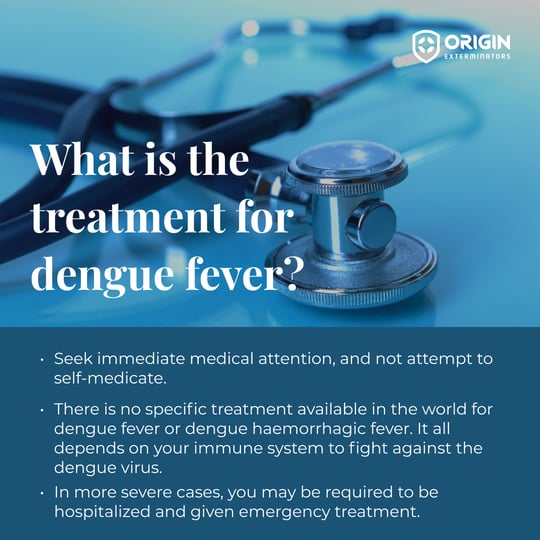
If you suspect you may have dengue, the best advice is to visit the nearest general practitioner, who will order a blood test for dengue. It is important that you seek immediate medical attention, and not attempt to self-medicate with supplements, vitamins, home remedy or healing with prayers and spiritual intervention.
There is no specific treatment available in the world for dengue fever or dengue hemorrhagic fever. It all depends on your immune system to fight against the dengue virus that is wreaking havoc inside your body. Treatment for dengue is supportive, meaning the doctor may order you to rest, monitor for severity, and keep yourself hydrated while your immune system does the fighting work. In more severe cases, you may be required to be hospitalized and given emergency treatment with fluid and electrolyte replacement or blood transfusion.
Is there a vaccine to prevent dengue infection?
Up until today, there are no highly effective vaccines or medicine that target dengue virus. According to experts, this is due to the possibility that antibodies, which are proteins produced by your own body when faced with an infection, that are raised against any one of the four types of dengue serotype may enhance the disease severity when the person is infected with a different serotype in the next infection. Therefore, an effective vaccine has to be able to stimulate equally strong protective responses simultaneously against all four dengue serotypes. Adding to the complication of vaccine development is that there are different virus strains within each serotype, and different strains can exhibit different shapes, enabling them to escape detection by the host’s immune system. For example, studies in Singapore by Duke-NUS Medical School have shown that the surface of the DENV-2 virus can change from smooth to bumpy depending on host conditions. Such unpredictability of the virus makes vaccines or any form of preventive medicine ineffective against the dengue virus.
Read More >> How Can You Protect Your Family From Dengue In Singapore?
Why is dengue on the rise since 2020?
While all four serotypes of the dengue virus circulate in Singapore, outbreaks here are caused by DENV-1 and DENV-2. According to NEA, DENV-2 has been the dominant strain since 2016. This means the Singapore population has high immunity to DENV-2. However, after almost three decades of quietness, DENV-3 has re-emerged in Singapore in 2020. This switch in dominant serotype usually precedes an outbreak. This is because with DENV-3 being new with fewer people infected, there is low herd immunity to DENV-3. Consequently, a larger proportion of the Singapore population is susceptible to DENV-3 infection, hence higher rates of transmission.
In addition, previous research work largely focused on DENV-2, hence other serotypes were not well studied. Little information is available on how the virus behaves or the severity of the disease caused by DENV-3, hence formulating epidemiology prediction models became more challenging than ever.
The National Environment Agency (NEA) has also attributed the outbreak last year to the disruption of normal life due to Circuit Breaker, which was implemented on 7 April 2020 in an effort to curb the transmission of Covid-19. A series of tough measures in place left construction sites and other mosquito breeding grounds undisturbed, vegetation around housing estates are not maintained, dry leaves that potentially collect stagnant water are not cleared, manpower for pest control operators, who played an important role in mosquito management, are curbed duet to Safe Management Measures and the entire nation came to a standstill in terms of environmental management.
Further, more people staying at home and working from home means more people are getting bitten by dengue-virus-infected Aedes mosquitoes since the majority of the breeding sites are found in homes.
What are the authorities doing to curb the transmission of the dengue virus?
In response to the soaring cases, NEA has stepped up checks to uncover breeding habitats and remove potential breeding sites from public areas and housing estates. Additionally, the heavier penalty is imposed for flouting anti-mosquito regulations, novel techniques such as the Wolbachia project is deployed, thermal fogging is carried out in cluster areas and there is a constant reminder to the public to carry out the 5-Step Mozzie Wipeout.
How often can we get dengue?
A person can be infected with any serotype of the dengue virus multiple times in his or her lifetime. Each infection may be caused by the same serotype that was infected before or a new serotype. Each infection confers lifelong immunity of that particular serotype to the infected person if he or she manages to recover.
Dengue virus does not discriminate, and so does Aedes female mosquito. Anyone can be bitten by a dengue virus-infected mosquito, whether you are an adult or child, male or female, Asian or Caucasian, local or foreigner, rich or poor, strong or weak.
How can we prevent dengue?
The single most effective way to prevent dengue is not to be bitten by an infected Aedes mosquito. There is no way to tell the difference between an infected and non-infected female mosquito. Therefore, as the NEA constantly reminds us, eliminating stagnant water to prevent the breeding of Aedes mosquitoes is the best way to prevent dengue.
The climate in Singapore is hot and humid, with rains during the monsoon months. Such climate provides ideal conditions for the breeding of mosquitoes. With our weather, the life cycle of Aedes mosquitoes can be completed, from egg to adult mosquito, in as short as 7 – 10 days. Premises with the vegetation surrounding the external perimeter or landscaping throughout the property are perfect grounds for dengue transmission, providing the breeding ground for mosquitoes to lay their eggs, giving plenty of opportunities for female mosquitoes to take a blood meal.
Read More >> How to Prevent Dengue from Spreading?
What are the steps we can do to keep our premises safe?
We therefore should always ensure a hygienic environment and adopt effective measures to prevent dengue transmission. Aedes mosquitoes are able to lay eggs in stagnant water the size of a 20 cent coin. The following are guidelines that we can suggest for you:
- A designated person should be appointed to coordinate mosquito prevention exercises; The designated person should always monitor the stagnant water removal effort and ensure proper housekeeping within the property.
- Stagnant water should be eliminated to prevent mosquitoes from breeding.
- It is not advisable to place any flowers or plants in water for aesthetic purposes unless the water is changed every 2 days to prevent mosquitoes from laying eggs.
- Flowerpot plates should not be allowed to accumulate stagnant water.
- Gardeners, janitors, or maintenance officers should pay special attention to stagnant water in decorative pots, flowerpot plates, and decorative items that are not found easily.
- Drains should be kept unclogged.
- Since Aedes mosquito can lay eggs in a small volume of stagnant water, trash such as beverage cans, food packaging boxes, etc. should be disposed of properly in waste bins with lids.
- Inspection of the entire compound should be conducted at least once a week in order to eliminate mosquito breeding sources.
- If necessary, windows and doors in classrooms should be installed with mosquito nets to prevent mosquitoes from biting people.
- Building Owners can hire reputable and trustworthy pest control companies to provide mosquito prevention and other disease vector control services.
- If anyone displays symptoms of dengue fever, such as prolonged fever and rashes, medical assistance should be sought promptly and the affected person sent home to prevent dengue transmission.
- Remind everyone to practice the “5-step Mozzie Wipeout” at home, to reduce dengue transmission so that everyone plays a part to keep everyone in the community safe from dengue.
- Advise everyone to use mosquito repellents especially if their home or office is in a dengue cluster, to minimize mosquito bites and the possibility of dengue transmission.
- Do refer to reputable websites for information on dengue in Singapore, such as the Ministry of Health website for dengue symptoms (https://www.moh.gov.sg/diseases-updates/dengue) and NEA website for updates on clusters and number of cases in the country (https://www.nea.gov.sg/dengue-zika/dengue).

.png)





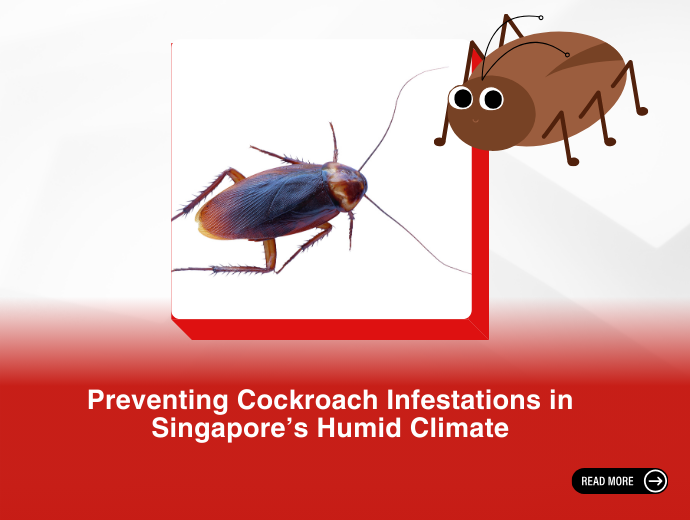
.png)
